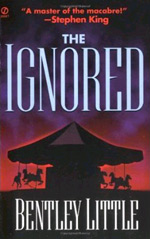
![]() verkisto
verkisto
7/26/2016
![]()
I work in a large corporation. I'm sort of a faceless drone, the kind of employee who's given one task after another as they become a priority for the higher-ups. We have a few hundred people who work in my building, and I'm the kind of person who nods and smiles and says "Hello" when passing people in the hallways. I'd say one in about ten people actually respond to my greetings; there are even some who will make eye contact for a split second, then immediately avert their gaze to something on the other side of the hall. I even get that sort of treatment from people I've worked with on previous projects. I don't get it. I've never understood what people have to lose by being polite, by acknowledging that someone standing near them exists.
The Ignored is about being someone like me, taken to the extreme. Here, the main character isn't just ignored; he's invisible to other people. It's a gradual sort of disappearance that begins with coworkers not noticing him, and then slowly becoming someone who doesn't even exist to anyone else around him. At first it's unnerving, but later it becomes troublesome. Later, he realizes that he can get away with anything, including murder, and what starts off as something frustrating becomes something liberating.
The main character, Bob, is not very likable; in fact, he's pretty pathetic. Little shows his helplessness and frustration well, but he also gives Bob the character trait of not wanting to do anything about it. He fights with his girlfriend, telling us that he knows she's not to blame, but does it anyway; he goes on for a few paragraphs about how they don't tell each other "I love you", and even feels like he should, but he doesn't; he has opportunities to confront his asshole supervisor over his behavior, but he never does. It's a kind of self-fulfilling self-destruction, and it's frustrating to read it. Once he goes through his liberating transformation, he goes on a sort of junior-high binge, doing all the things he's always dreamed of doing, and it's hard to be sympathetic to him when he seems so immature.
Then there was the moment in the story where another character defends rape, and even convinces Bob of it. I never got the feeling that Little himself was defending it, but it was certainly a questionable manifesto to include in the story.
The story jumps all over the place, and it made me feel like Little started the book out with a premise, and just started writing from there. The first quarter of the book was tight, and followed the same growing tension that was such a critical part of The Mailman, but then it started taking a lot of jaunts outside of the main story. Later works by Stephen King feel a lot like that, and I can't help but feel like Little was writing this story without a clear idea of where it was going. The middle of the book felt like it meandered too much.
On the plus side, Little has a knack for capturing his characters' emotions well. This particular passage stood out to me:
"It was a bad end to a bad day, and I can't say that I was surprised. It seemed somehow appropriate. So many things had gone so wrong for so long that what would have once sent me into paroxysms of panic now did not even phase me. I just felt tired."
It's not just that he captured that moment so well; it's also a moment we've all experienced, allowing us to relate to the character. Here are a couple more examples:
"All of a sudden I felt strange wandering from shop to shop alone, anonymously, not noticed or known by anybody. I felt uncomfortable, and I wanted to be with Jane. She might be busy studying, she might not have time to do anything with me right now, but at least she knew who I was...."
"Even if no one else was aware of me, I was acutely aware of them."
I find his writing style, in general, to be on point and thought-provoking outside of the story itself.
I wouldn't consider this the best of Little's works, and given that I've only read three of his books so far, that's saying something. Had I started here with his books, I might not have felt enough interest to go any further; it's a compelling story, but it suffers from a lack of focus and an unsympathetic main character. Luckily, having seen what he can do with The Mailman, I'm willing to consider this one a fluke and keep on reading his books.